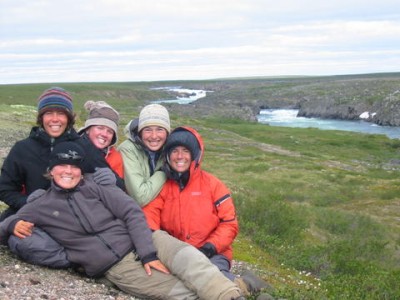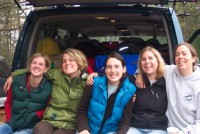08/14/2005, Mt. Meadowbank, Back River; 66 deg. 12 min. North; 96 deg. 56 min. West

Another week finds us farther north, a little more weathered, but as cheerful and content as ever. It was a week devoted to the Meadowbank River, down which we traveled with a steady pace. We were neither rushing nor dragging our feet at this point in the trip. It is hard to push forward when each mile puts you closer to the last mile, but then it is also hard to slow down when it is too cold to sit around and paddling less than furiously would result in being blown backwards by head wind. So we have settled again into the rhythm of days flowing into each other, taking advantage of breaks in the weather to play Frisbee and hike along the tall eskers, mirroring the shore, and huddling in the tent at night to read The Desperate People aloud.
Mostly we paddle in silence or in laughter, taking careful note of the land around us. As days and miles passed, we felt a growing attachment to the Meadowbank. Smaller than the Dubawnt, and smaller than the Thelon, our journey from headwaters to confluence took on an intimate personal feel. This is contrasted by the increasingly harsh and alien landscape. The tundra here is more rocks than earth. In places the smooth bedrock faces dive into the water. At times the shore consists of high ridges where jumbled rocks seem suspended above us in a permanent cascade. My favorite has been the eskers -- narrow ridges rising above away from the shore and winding strenuously across the land. They are primordial and unmistakably reptilian, like the upper half of some ancient monster buried in the ground. It is a desolate landscape, where the bones of the earth are close to the surface. To a woman, we find it starkly beautiful. I wonder how it would appear through the eyes of someone without our demonstrated love for barren, lonely places.
Toward the end, the river itself came to life even as life appeared on its shores. For a few days it seemed as though we could not turn a bend without finding a handful of caribou silhouetted against the ridges or a solitary, curious buck prancing along the gravel beach. We encountered more musk oxen as well, often seeing them far in the distance as black spots roaming the landscape, but on one occasion getting close to another herd of 20 or so. The river during these days grew narrow and dropped through long stretches of whitewater. After the Dubawnt sized steps in the last two months, we had to readjust to the shallow and narrow rapids of a smaller river at lower water levels. Our technical skills were put to good use as we maneuvered through narrow shoots and around small ledges. On an expedition such as this one, so heavily loaded and with the water and weather so cold, whitewater invokes a delicate balance between anxiety and excitement. But once again, a combination of respect for the river and good communication with each other saw us emerge unscathed at the confluence with the Back River two days ago. After dinner, including a confluence cake, of course, Meg and I took a walk over to the point where the courses of these two Arctic rivers meet and looked across the water to the high, colored cliffs, where the waters of each begin their final descent to the Arctic Ocean. The cold stream looked tangible. The ground seemed to tilt northward between our feet on the edge of this, our final river.
As we struck out into the wide, fast channel of the Back the next morning, I wondered to myself what more I could include in this update to help describe what it is like to be on trail for 80 days. To be honest, much of what we do and how we live is not much different from what first year campers at Manito-wish learn on three-day canoeing trips in Northern Wisconsin. Sure, we're a fair bit grimier and have seen more ice and musk oxen than your average canoeing trip, but much of the underlying framework takes a form of universal trail truths known to Manito-wish campers from Boulder Junction to the Brooks Range and people everywhere who love and visit the wilderness. For instance, you will never get tired of eating, talking about or dreaming of food. We aren't talking about fresh mangos, or ice cream, or other distant luxuries; we're talking about the same refried beans or oatmeal you've been eating for 79 days. As an example of this phenomenon, here are two short poems that I composed while paddling yesterday.
Ode to Our Daily Luna Bar
After a morning of wind and rain,
When I feel I'll never be warm again,
My trip mates turn to me and ask,
Are you feeling up to the task?
A giant rapid is on the way,
But luckily in my PFD each day,
There is a miniature slice of heaven,
Oh, if I only had seven!
Cranberry somores, lemon zest,
I still don't know which is the best.
Paddle in hand, I'm ready to run,
Thanks Luna Bar, you're number one.
This second is a tribute, in Haiku form, to Usingers All Beef Summer Sausage
Another TL,
The same old food for two months.
What will I eat now?
My stomach she groans
Searching for some sustenance,
In the Wannigan.
Usingers Sausage,
A treat full of energy,
Keeps me warm all day.
Another example of a universal trail truth. The longer you are out, the funnier you and your trip mates become. After 80 some days, you'd think it would all get a little bit old, but not so. I still laugh to the point of tears at least once a day. One memorable moment recently was when Meg demonstrated how she would utilize the fry-bake (a glorified handle-less fry pan) if we were to hold a hypothetical dance-off which involved pieces of our gear. Of course, some of the things we laugh at may or may not be actually funny -- or instance the Haikus in last week's update.
In these ways and others, our connection to Manito-wish permeates our daily lives despite our distance from Boulder Junction. In fact, I think we could make a rather funny poster, "Everything I Know About Expedition Canoeing I Learned in Near South." (Near South being the first year at Manito-wish). These include everyday observations as well as the deeper lessons that have influenced our lives so greatly. It was at Manito-wish that we learned that sisterhood is born of laughter and common purpose and strengthened by hardship and challenge, where we learn that beauty comes in many forms and that anything can be beautiful because of its utility, a landscape beautiful for its emptiness and a person beautiful because she is at once strong and kind. And we learn that cold mornings, head winds, icy lakes, rainy days, long portages and even curious bears are physical challenges that are best met with a giant deal of mental strength, teamwork and preparation. These are lessons that can be learned in many places and in many ways, but Manito-wish was the place and the way that the five of us experienced and we are excited and grateful that this trip has given us the opportunity to give something back and to contribute to future generations of campers. Our greater mission provides a strong, steady undercurrent to the goals of every day, and one of the things we look forward to the most at the end of the trip is seeing how the endowment is fairing and continuing to share our story and inspire further generations.
As I write this update, it is early morning on the Back River. For once the north wind is not hollowing and the only sounds I can hear are the faint hum of black flies and the roar of the stove beside me. I am sitting beneath the tundra tarp, brewing coffee and reading Down the River by Edward Abbey while my trip mates still sleep. We are camped in a small, sandy cove on the northern shore of the river. The massive shoulder of Mt. Meadowbank is reflected in the perfect stillness of the water. We will rest here today, using our stiff shoulders and climbing Mt. Meadowbank, preparing ourselves mentally and physically for the last push down the Back to Chantrey Inlet. Beyond that point we have yet to consider.
Somehow we have managed the delicate feat of separating our anticipation for reaching our goal from the dreaded finality of reaching the end. As I turn the stove off and brew my coffee, I am struck again by how eerie the stillness is. I am used to the way the wind roars across the great emptiness of the tundra to the tired euphoria of my body after a day of hard work, fresh air and laughter, used to relying on myself for friendship and wisdom of four sisters and the memories of loved ones to get me through day after day. I long on occasion for a fresh apple, a shower or a phone call with my family, of course, but in many ways this is the only way of life we know now, which brings me to the most universal of all truths about trail. It is never long enough.
View Photos from All Three Resupplies CLICK HERE
Support the Borealis Campership Fund at Camp Manito-wish YMCA
